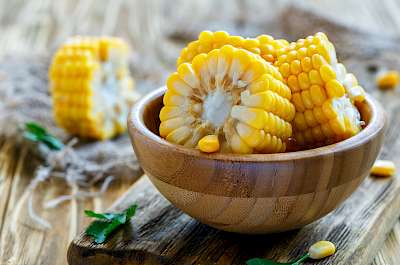Corn: Calories and Nutrition Analyse
Also known as (other names): Maize
How many calories in corn?

Nutrition Facts
CornServing size:
medium size corn (185 g) change
5g10g15g20g30g40g50g60g80g100g120g140g160g180g200g220g250g300g350g400g450g500g600g700g800g900g1000g
1oz2oz3oz4oz5oz6oz7oz8oz10oz12oz15oz20oz25oz30oz35oz40oz50oz
Amount Per Serving:
100g of corn contain about 86 calories (kcal).
Calories per:
ounce
| one corn
| tablespoon
| teaspoon
| cup
| half cup
| small can
| medium can
In particular, a medium size corn (185 g) contain about 159 calories.
This is about 8% of the daily caloric intake for an average adult with medium weight and activity level (assuming a 2000 kcal daily intake).
Scroll down for details and nutrition tables.
To visualize how much 159 kcal actually is, keep in mind that the calorie content of corn is similar to that of, for example:
- 3 apples
- 2 glasses of Coca Cola (220 ml glass)
- 1.5 slices of cheese
- 1.5 slices of bread
- 1 glass of milk
- 8 cubes of sugar
Take a quick look at the tables below for detailed information about corn nutrition.
100g of Corn
Nutrition
- Calories86
- Carbs Total14.69 g
- Dietary fiber2.43 g
- Fat1.63 g
- Saturated fat0.3 g
- Protein2.79 g
- Water80.25 g
Vitamins
- Vit A187 IU
- Vit B1 (Thiamine)0.079 mg
- Vit B2 (riboflavin)0.138 mg
- Vit B3 (Niacin)1.593 mg
- Vit B50.717 mg
- Vit B60.15 mg
- Vit B9 (Folic acid)42 mcg
- Vit C6.8 mg
- Vit E0.07 mg
- Vit K0.3 mg
Minerals
- Potassium237 mg
- Phosphorus2.513 mg
- Magnessium25.76 mg
- Calcium0.656 mg
- Iron0.388 mg
- Zink2.513 mg
- Beta karoten16 mg
Discover the Nutritional Powerhouse: Corn
Often seen as a staple in diets around the world, corn is not just a versatile crop but also a nutritional powerhouse. Whether you're enjoying a warm, buttery cob at a summer barbecue or savoring sweet kernels in a hearty salad, corn offers more than just delightful flavors. Let's dive into the fascinating world of corn nutrition, exploring its calorie content, protein, fats, and carbs, and why it deserves a spot in your healthy diet.
Corn Calories and Nutritional Benefits
One medium ear of corn (approximately 90 grams) packs about 86 calories, making it a low-calorie option for those managing their weight. But don't let its modest calorie count fool you; corn is brimming with essential nutrients that can benefit your health in numerous ways.
Carbs in Corn
With 18.7 grams of carbohydrates per serving, corn is a good source of energy. These carbs include 2 grams of fiber, which aids in digestion and helps you feel full longer, making corn a great ally in weight management and digestive health.
Protein in Corn
Protein is crucial for building and repairing tissues, and corn contributes to your daily protein intake with 3.27 grams per serving. While it's not a high-protein food, it can be part of a balanced diet, especially when combined with other protein sources.
Fat in Corn
Corn is low in fat, with just 1.35 grams per serving, and contains negligible amounts of saturated fat. This makes it a heart-healthy choice, as diets low in saturated fat can reduce the risk of heart disease.
Vitamins and Minerals Galore
Corn is not just about macronutrients; it's also rich in vitamins and minerals. It provides vitamin A (187 IU), B-vitamins like B1, B2, B3, B5, B6, and B9, vitamin C (6.8 mg), E, and K, alongside essential minerals such as magnesium (37 mg), potassium (270 mg), and zinc (0.46 mg). These nutrients play vital roles in everything from energy production to maintaining healthy skin and vision.
The Role of Corn in a Healthy Diet
Given its nutritional profile, corn can play a significant role in a healthy diet. Its fiber content supports digestive health, while its low fat and calorie content make it a weight-friendly food. The vitamins and minerals in corn support various bodily functions, making it a nutritious addition to your meals.
However, it's important to consume corn as part of a balanced diet. While it's nutritious, relying solely on corn for nutrition can lead to deficiencies, as no single food can provide all the nutrients your body needs. Enjoy corn in moderation, combined with a variety of other fruits, vegetables, grains, and protein sources for a well-rounded diet.
In conclusion, corn is more than just a tasty addition to your meals; it's a nutritional gem that offers numerous health benefits. From its carbs in corn that provide energy to the protein in corn that supports muscle health, and the minimal fat in corn making it a heart-healthy choice, there's every reason to include this versatile vegetable in your diet. So next time you're enjoying a delicious corn dish, remember you're not just satisfying your taste buds, but you're also nourishing your body.
How many calories are there in 1, 2, 3, or 5 servings of corn?
- Medium size corn (185 g)159 kcal
- Tablespoon of corn (15g)13 kcal
- Teaspoon of corn (5g)4 kcal
- Cup of corn (164g)141 kcal
- Half cup of corn (82g)71 kcal
- Corn small can (140g)120 kcal
- Corn medium can (285g)245 kcal
- Ounce (oz) of corn24 kcal
- Half of medium size servings of corn79.5 kcal
- Small size serving of corn (148g)127.2 kcal
- Big size corn (241g)206.7 kcal
- Two medium size servings of corn318 kcal
- Three medium size servings of corn477 kcal
- Four medium size servings of corn636 kcal
- Five medium size servings of corn795 kcal

Similar calories number have:
See also:
Read this:
- How many calories does zucchini have?
- Calories in handful of buckwheat
- Calories in tablespoon of buckwheat
- How many carbs (carbohydrates) in brazil nuts?
- How much fat in cashew nuts?
- How much protein in chestnuts?
- What is weight of chia seeds?
- Coconut calories per ounce (oz)
- Linseed calories per serving size



Add comment